Roger Glover: “I improved when Steve Morse joined the band; Ritchie Blackmore wasn’t happy with me because I didn’t practise very much”
The Deep Purple bass legend looks back
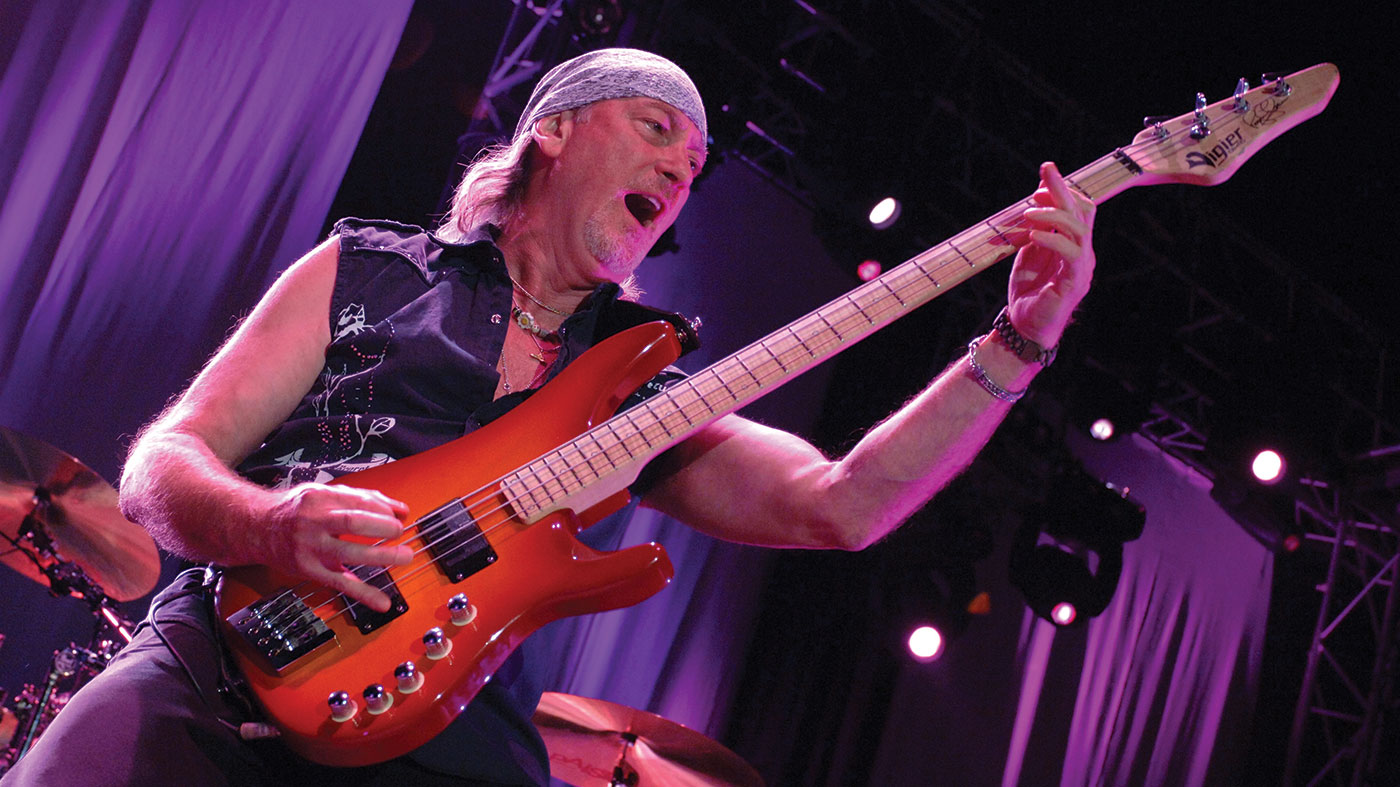
As the headbangers among us know all too well, Deep Purple are often mentioned in the same breath as fellow British rock behemoths Black Sabbath and Led Zeppelin.
All three bands came to prominence in the late-'60s and early '70s; all played a blend of hard rock and heavy metal; and all left a legacy of incalculable importance to fans of unsociably heavy music. Zeppelin lasted a mere eight years, quitting in tragic circumstances in 1980; Sabbath lasted right up until a few months ago, although they often went on hiatus along the way; and Purple have stayed the course with very few breaks, hitting their 50th anniversary this year.
Glover, now 72, has played with Rainbow, David Coverdale, Alice Cooper and many more stellar musicians
Depending on your point of view, the band’s most successful (or most purple?) period has either centred on the Mark II line-up from 1969-73, or the combined Mark VII and VIII line-ups which have toured since 1994.
The former consisted of Ian Gillan (vocals), Ritchie Blackmore (guitar), Roger Glover (bass), Jon Lord (keyboards) and Ian Paice (drums), while the latter replaced Blackmore with Steve Morse and the late Lord with Don Airey. The Mark II line-up came up with most of Purple’s best-known albums and songs, with a notable exception being Burn, released in 1973, which featured David Coverdale on vocals and our chum Glenn Hughes on bass.
However, the recent line-ups are Purple’s most consistent, staying on the road for enormous lengths of time and playing the world’s biggest venues. Just last month, a massive co-headline tour of America with Judas Priest was announced, and although Purple’s live dates over the last few years have been grouped under the umbrella of ‘The Long Goodbye Tour’, it’s unlikely that they’ll be retiring just yet.
Bassist Glover, now 72, has played with Rainbow, David Coverdale, Alice Cooper and many more stellar musicians. As a producer, he has helmed albums by Status Quo, Judas Priest, Rainbow, Nazareth, Dream Theater and more, and has released solo projects such as The Butterfly Ball, a 1974 concept LP.
The man has been pretty busy, as he explained when he appeared at the London Bass Guitar Show in 2014 and in the interview you see here, where he discusses shopping for basses, his personal feelings about his status as a musician, and what the future holds.
Get the MusicRadar Newsletter
Want all the hottest music and gear news, reviews, deals, features and more, direct to your inbox? Sign up here.
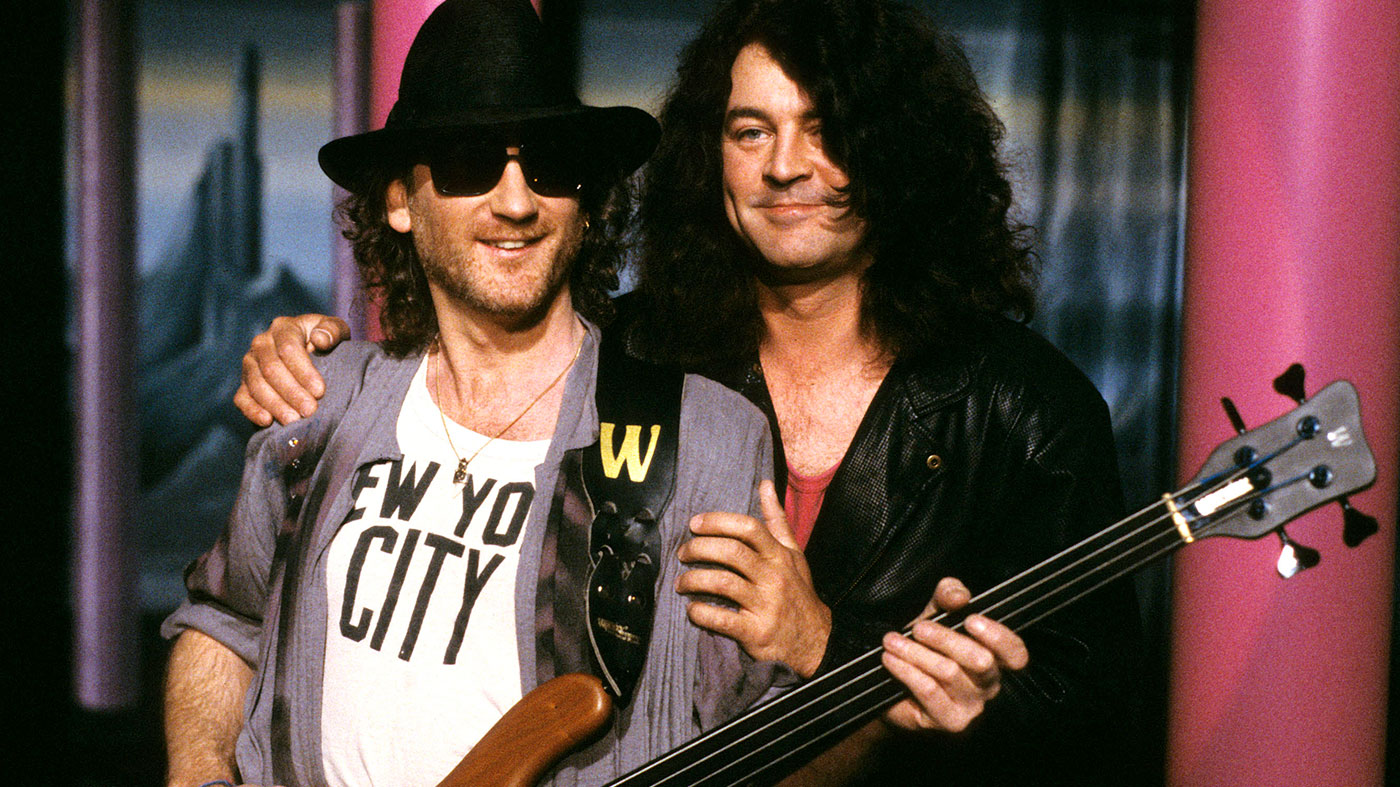
End of the road
Roger, Purple are about to head out alongside Judas Priest for a major US tour. Is touring more physically tough these days?
“Well, you do learn to pace yourself. You can’t get hammered every night like you did in your 20s - the hangovers are far more serious! We do travel in the most comfortable way we can; we’ll charter a small plane rather than hang around in airports for cancelled flights.
“I love touring on a bus, but not everyone in the band can sleep on a bus like I can. I think that as a band you’re never as together as you are on a bus tour. You spend time, and you bond, and that doesn’t happen in an airport lounge.”
Will last year’s Infinite album be the last from your band?
The realisation is there that sooner or later we are going to have to stop
“No. All we’re doing [with the Long Goodbye tour] is putting our fans on notice that we’re in our 70s now. Ian Paice had a minor health hiccup a while back, but two weeks later we were back on tour. It was a minor thing, but it was a wake-up call. I hate to use that term, but that’s what it was. It was a warning.
“Deep Purple has been such a presence in our lives for 50 years that none of us want it to end, but the realisation is there that sooner or later we are going to have to stop. I’d love to go on and make another album. Emotionally we’re not ready to stop, so we could carry on for another four or five years.”
Do you remember your first bass guitar?
“My very first bass was a Spanish guitar with the top two strings taken off and a pickup put on. I saw a band of bigger kids rehearsing for the end-of-term show at school, and I was just mesmerised. I was in a little group of guys, swapping playing tips, and I knew we had to get a band going. We did, and competed with that other band. When people left for college or jobs, the two bands combined. The first proper bass I got was a Hofner Precision copy, and the most important thing about it was that it was red! We all had matching guitars then.”
What was your dream bass at the time?
“I dreamed of a Fender Precision. The Shadows were the huge heroes of the day, and I used to look at their album covers and check out the Precision that Jet Harris was holding. In those days, Precisions were hard to get; we had lots of European guitars, but nothing much from America. When I did get my first Precision, I took it home, laid it on my bed and just stared at it for about two hours, drinking in every curve, every detail.”
Do you still have it?
“Sadly, I sold it, which I regret. I mentioned that in a magazine, and a guy called up and said he had it, and to give him a call. This was about 1980, when we were playing the Hammersmith Odeon. I called him, and went round to his house, and there it was.
“Someone had done a horrible paint job on it, and painted it purple. A screw hole I had once made was there, so I knew it was mine - but when I picked it up, I felt no emotional connection with it at all. I asked him how much he wanted for it, and he asked for £5,000, which would be triple that amount today. I decided that I didn’t want it that badly!”
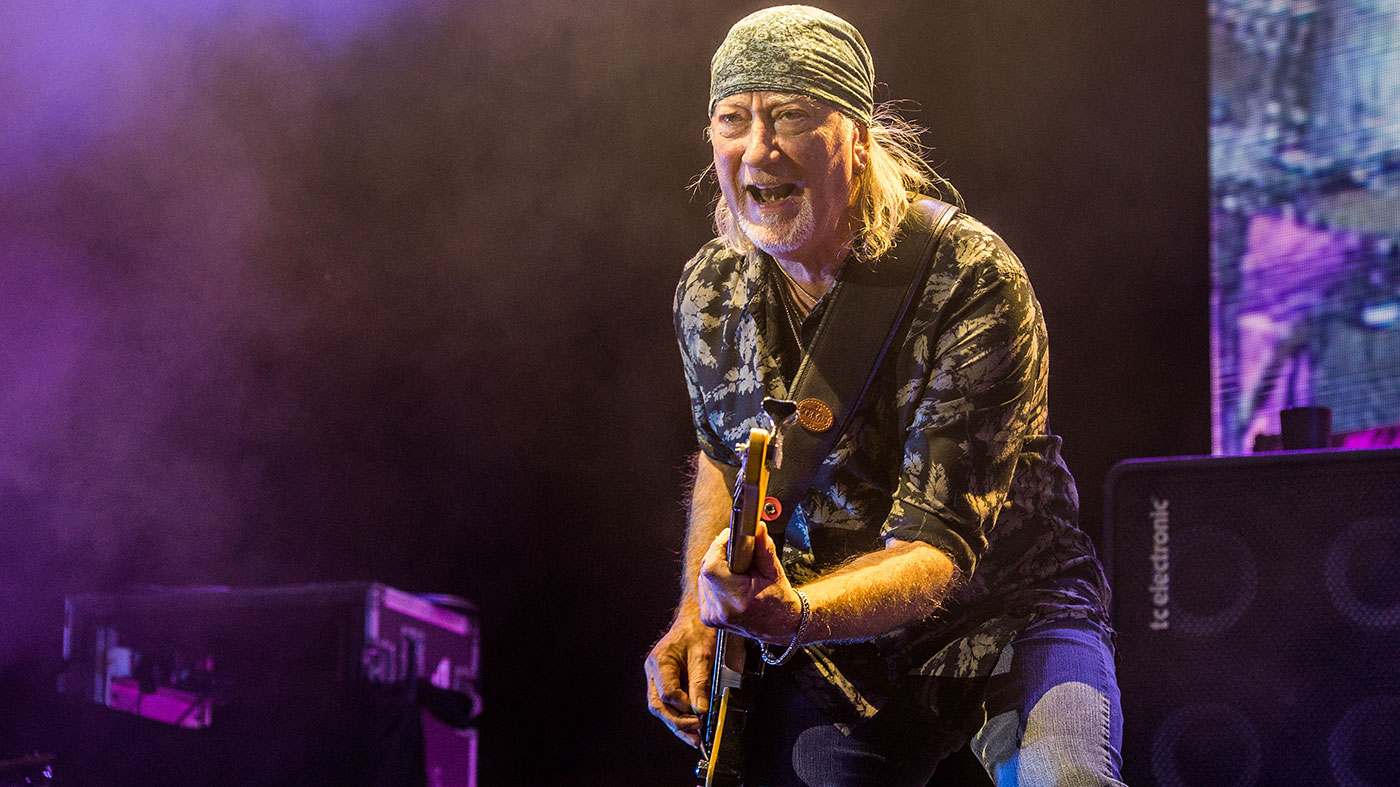
Vintage Vigier
Tell us about your signature Vigier basses.
“I’ve been with them for about 20 years. They’re great guitars. They’re very consistent and they don’t drift out of tune; they have a graphite rod in the neck so the temperature doesn’t affect them.
“Vigier are a great company and they look after me very well. I still like Fender Precisions; there’s something about a Precision that makes you feel as if it’s bass all the way up the fretboard, because some basses get pingier and thinner the further up you go. With a Precision, even high up on the G string, you get that good punchy bass feel. But I use Vigiers on stage, because mine has a cutaway body and I can get higher up the neck, which I like. You can’t always get that ease of access with a Precision.”
Which basses did you play on Infinite?
I’ve never been forthcoming about my abilities as a bass player, so I’m always searching for a bass that will make me sound better than I am
“When we arrived to record the album, our producer Bob Ezrin looked at my Vigier bass and said that it was very nice, but that I might want to try out a bass that he was going to bring in because it records really well. The next day he brought in a Precision, and from the look of it, the strings were put on it back in the 1800s! Of course, it was as dead as a doornail, and I said that we’d have to change the strings. No, said Bob very clearly, it’s been played on Pink Floyd albums, and albums by Peter Gabriel and Alice Cooper, so we can’t change the strings. Lots of people have played this bass because it records really well. He was right; it did sound really good.”
Do you have a lot of basses?
“I do have quite a few. I’ve never been forthcoming about my abilities as a bass player, so I’m always searching for a bass that will make me sound better than I am. I’ve had a Fender Mustang, and a Gibson reverse Thunderbird; I have a couple of those still. I had a Peavey, which they gave me and I played for a year or two, and I had an Ovation solidbody bass. I’ve got rid of a few of them. I give them to charity sometimes. Nowadays I guess I have about 20 basses. Having lots of them means having to find space to put them in!”
“Any budget basses in the collection?
“A while back I went out to buy a Precision in Nashville, and I tried loads of vintage models at really high prices. None of them really sounded that good, but the guy showed me one that played really nicely. It was salmon pink, which was a bit unfortunate, but I liked it, and I asked him how much he wanted for it. He said ‘Twonine’, which I assumed meant $2900, but he said ‘No, 290 dollars, or 300 with the case’, and I thought, wow, that’s a deal right there! It was a Far Eastern model, second-hand, so it probably cost $400 new. It’s great.”
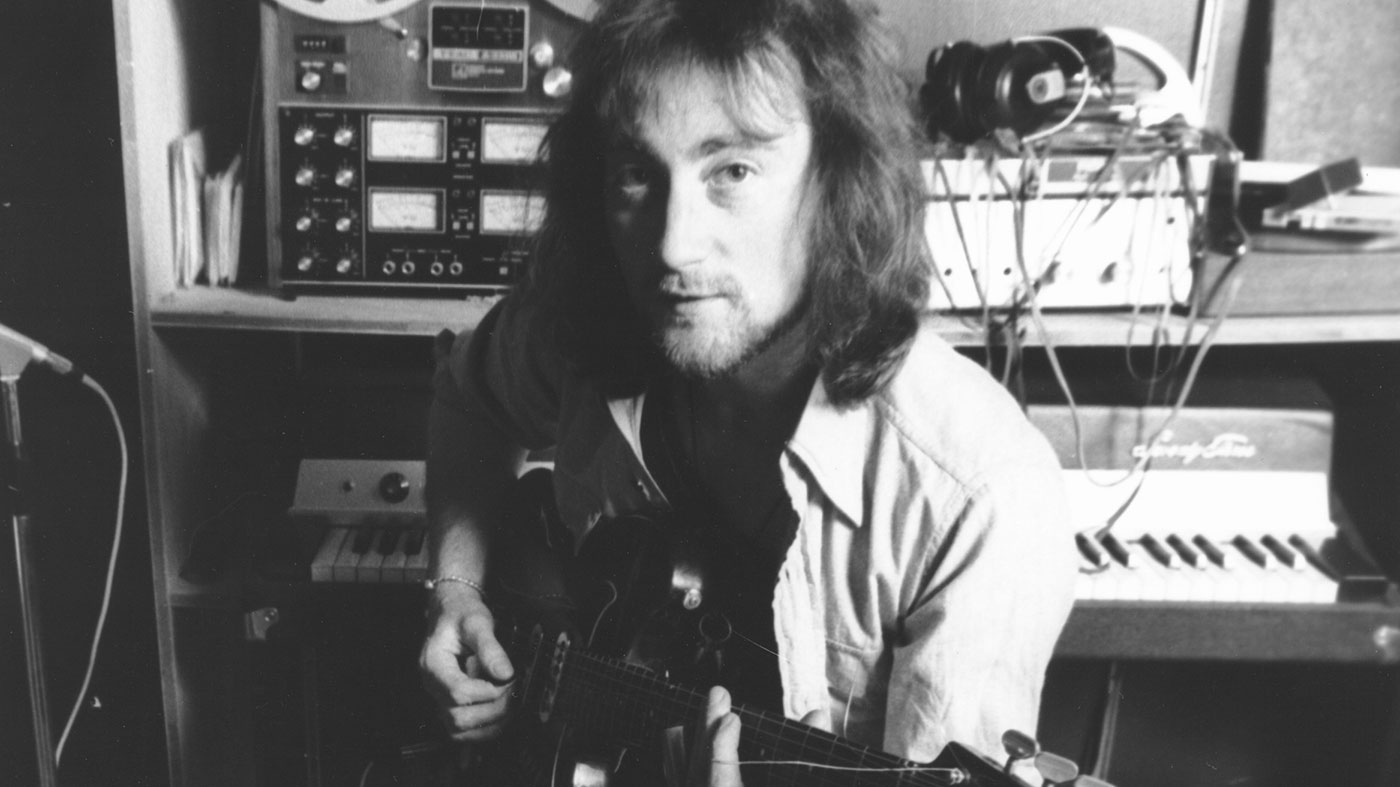
Keeping Paice
How do you compose your bass parts?
“I get a basic sense of what is needed, and I work very closely with Ian Paice, of course. There’s that old joke: a bass player is someone who is halfway between a drummer and a musician. That’s actually got a grain of truth in it - a guitar is a musical instrument, and drums are a percussion instrument, and the bass is both.
When I first joined Deep Purple, Pacey said to me, ‘I don’t follow, I lead’
“When I first joined Deep Purple, Pacey said to me, ‘I don’t follow, I lead’, which is absolutely fair enough. He’s a master of his instrument, whereas I didn’t take bass all that seriously in the early days. I just wanted to be a songwriter, that was what it was all about to me, and if I needed to be a bass player to do that, then fine, no problem.”
What’s your view on effects?
“I’m not fond of effects, unless they’re for a specific purpose. Deep Purple have a very loud sound, and in general, it’s a pure sound. If you put an effect on, you’re putting a sheen on top of the sound - you’re not actually adding to it in real terms, and you diminish the organic sound of the bass. If you’re playing alongside organ and guitar, as I am, I want the bass to be felt. I don’t expect to be heard note for note, but I do want people to feel the bass there.”
Is there room for complex bass parts in Purple?
“I believe in playing simply, because of the virtuosity that surrounds me in the rest of the band. I have to be the bedrock for them to lie on and do what they do. Having said that, I do like bass-lines that are not obvious. Throwing in the occasional major or minor third changes things up. I never think too much about what I play - I just like to go for what feels and sounds right at the time. It’s all about feel, and following the song.”
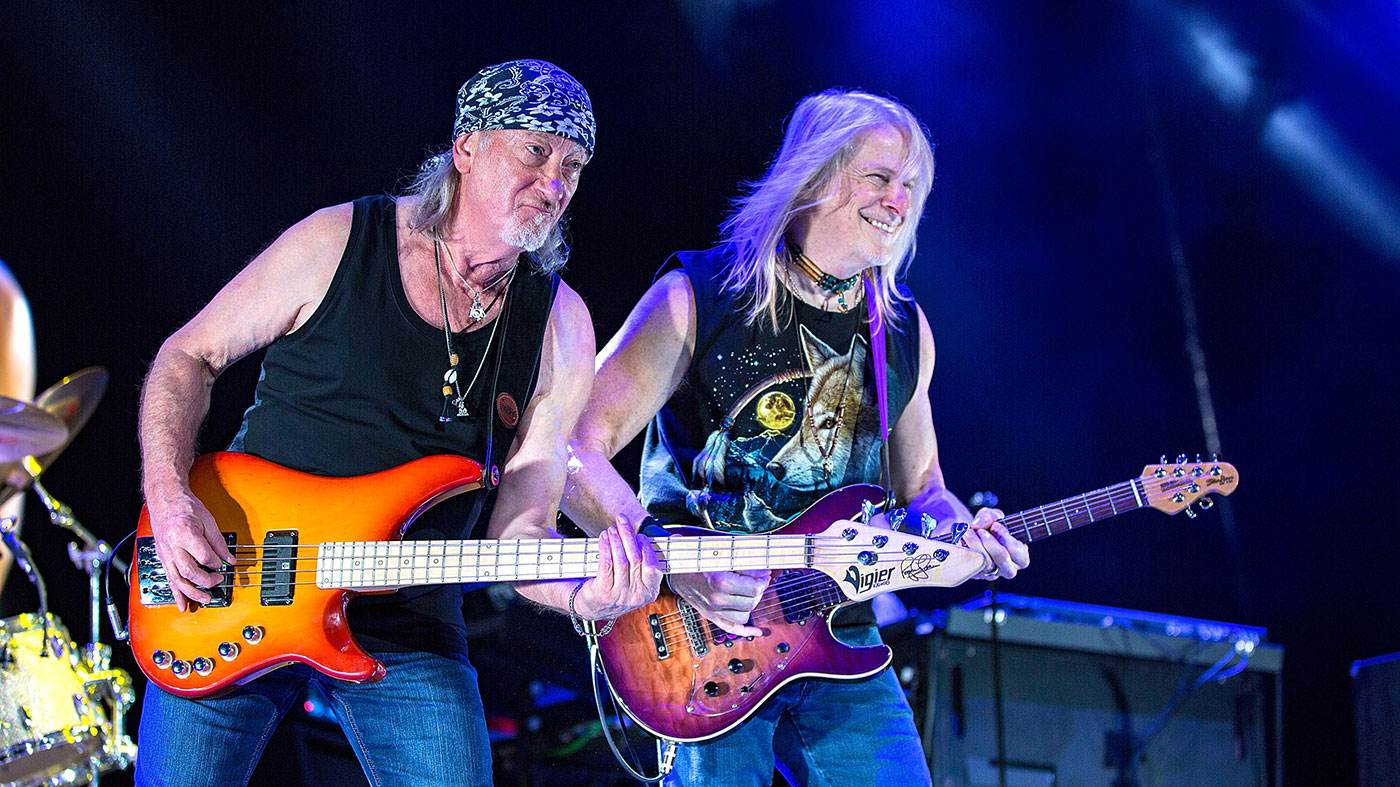
Morse code
Given the level of musicianship in Purple, are you comfortable with your level of technical ability?
“Comfortable is not a word I would use. I think I improved when Steve Morse joined the band in 1994, because I started to take myself much more seriously as a musician. I think Ritchie Blackmore wasn’t happy with me because I didn’t practise very much. What I did was good enough to keep my place in the band, but I didn’t stand out as a bass player.
Steve Morse was a revelation - someone with the patience to show me something
“When Steve joined the band, I said to him, ‘Don’t expect me to play like the bass players you’ve worked with - I’m not that kind of bass player.’ He said that was fine, and that I had feel in my playing, which was a nice compliment from him. I learned a lot from Steve.”
What, specifically?
“So, he played a riff on the bass, and I said ‘Steve, I can’t do that. Trust me, it’s not within my capability’. And he said ‘Yes it is, give me 15 minutes!’ and he showed me some things. After that I could do the part he played. It was a revelation - someone with the patience to show me something. I’d never had that before.
“I’ve improved a lot with his help. If people say I’m a great bass player I feel uncomfortable; I don’t feel good about taking praise for something that I don’t actually believe is true. I’m told I am good because people hear me with Deep Purple, and that’s down to the musicians I play with, rather than anything that I do.”
Do you have plans for life after Deep Purple?
“Well, I know I’ll always been involved in music, as a writer and as a producer. To be honest, I’m dreading life without Deep Purple. I’m not looking forward to it at all. This has been my working life; I’ve never had a job. We don’t have a final time to stop in mind. I don’t know how much time I’ll have after the band, but I’ll carry on being creative.”
Will you write an autobiography?
“Yes, I’ve been working on one for about five years now. It’s not easy, because I didn’t want a ghostwriter, but I enjoy good writing, and it’s a pleasure to write. It’s hard to look back and capture who I was years ago. I look at videos of myself playing and I think, ‘Who is that person?’
“It’s not possible to capture what was in your mind at the time, because memories aren’t always reliable. I’ve found a load of diaries from the '60s, and I’ve kept a journal for the last 30 years or so. I just have to work out what I did in the '70s!”
How would you sum up half a century on the road?
“I recently found the diary entry that I wrote when it was confirmed that I was joining Deep Purple in 1969. I wrote ‘Feeling 10 miles high…’ That just about sums it up.”


“Every note counts and fits perfectly”: Kirk Hammett names his best Metallica solo – and no, it’s not One or Master Of Puppets
“I can write anything... Just tell me what you want. You want death metal in C? Okay, here it is. A little country and western? Reggae, blues, whatever”: Yngwie Malmsteen on classical epiphanies, modern art and why he embraces the cliff edge









